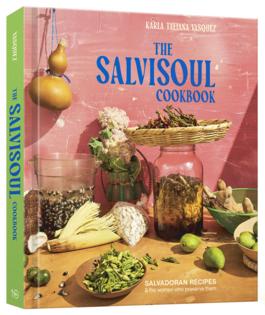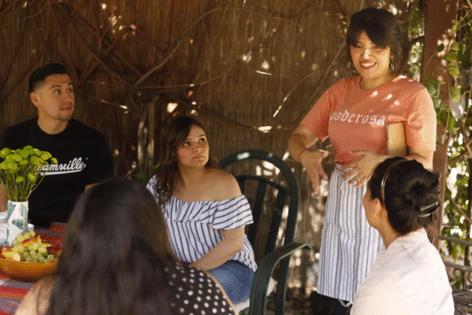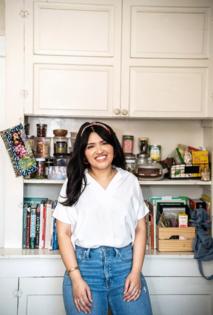A Salvadoran cookbook from a major publisher is finally here. Why did it take so long?
Published in Variety Menu
LOS ANGELES -- Food never happened in a vacuum for Karla Tatiana Vasquez. Stories always followed.
Whenever her grandmother or mother cooked, Vasquez knew something special was coming. Their food unlocked memories, especially about El Salvador — the homeland they'd fled in the late 1980s during the country's civil war.
Vasquez was born in the Central American nation but had no memory of it. She was an infant when her family spirited her away to Los Angeles, where many family members ended up settling. As a child, Vasquez had a difficult time saying "Salvadoreño" without tripping up on the roller coaster of a word.
At school, she struggled with anxiety and a sense of belonging. She felt lost.
But at the dinner table, she felt grounded.
Between bites of tortilla and the chilled minced beef dish salpicón de res, Vasquez's grandmother, mother, father and aunts took turns unraveling stories that served as fragments to a bigger tapestry that made up her identity.
She began to find her place in the world. She got answers to lingering questions about who she was and where she came from. She took those moments of storytelling seriously. She listened.
"We're not just saying words here," Vasquez remembers thinking to herself. "There is something my parents are processing. There is a quality here that feels precious."
Their stories were vivid.
Vazquez could see the mango trees. She could imagine the coffee plantations. She could feel the grit it took to wake up at 4 a.m. to go into the fields to pick the coffee.
Every evening around the dinner table, surrounded by extended family and food, these stories played like a movie in her mind.
"This is where I'm from," she told herself.
It makes sense that Vasquez, trained as a journalist, chef and food historian, wouldn't write just any book about her life or culture. This month she is publishing "The SalviSoul Cookbook," the first-ever Salvadoran cookbook to appear on a Big Five imprint.
The feat is part of a journey nearly a decade in the making. Since 2015, she's run SalviSoul, a website and media brand centered on Salvadoran cuisine and the women who preserve and share their culinary knowledge through recipes, cooking classes and live events. About the same time, she started trying to put the recipes and stories she was collecting into a draft of a cookbook.
At first, many doors were shut on her, Vasquez says. It took years to find an agent to represent "SalviSoul" and for publishers to take notice. Only a handful of self-published and small-press Salvadoran cookbooks had been previously available — including 2013's well-regarded "Delicious El Salvador" by L.A.-based cooking teacher and author Alicia Maher.
One book agent told her that the "American public" didn't know, and perhaps did not care, about Salvadoran cooking.
"I'm the American public," Vasquez thought to herself. "There are many people who look like me and who want this book."
That thought kept her going, until she sold her book to Ten Speed Press. One of the leading cookbook publishers in the country, Ten Speed Press is an imprint of Crown Publishing Group, which is a subsidiary of Penguin Random House. "The SalviSoul Cookbook" debuts April 30, featuring 80 defining Salvadoran recipes and stories about the 25 matriarchs who shared them with Vasquez.
"Having the book be a cookbook was the most honest way for me to write this story," Vasquez says. "I think a lot of the reason why the cookbook is stories and recipes is because that is how I've come to understand my Salvi upbringing. That's how I've been able to touch it when I've been so far away from it."
"The stories have been my food. The stories have taught me something about living," she says. "The stories have taught me something about love, loss and war. It taught me something about sarcasm."
Getting the book out into the world also taught her about persistence.
It all started with a craving for salpicón. She had never prepared the refreshing salad of minced lean beef, mint, radish, red onion and lime juice. But she wanted to recapture the dish and the feelings it evoked of lazy Saturday afternoons with family, relaxing and laughing.
At the time, she scoured the internet for a recipe but couldn't find one. She tried looking for Salvadoran cookbooks but came up short. She discovered one book that was self-published, and another one from El Salvador that was out of print and going for $100 online.
That's when she decided to do something about the scarcity of Central American voices in the food world and start the SalviSoul website.
For Vasquez, the project became a continuation of the journey she'd begun as a child, listening to stories at the dinner table. She wanted to get to know herself and her country of origin.
"El Salvador is a small little corner in the world, but it has been the biggest question of my life," she says.
She started with the most revered person in her life — her maternal grandmother, Lucia Campos Monterrosa, whom Vasquez affectionately calls Mamá Lucy. She was Vasquez's first interview for the book. Mamá Lucy became something of her muse and gave Vasquez not only her blessing but the confidence to leave her job and pursue her book.
In 2017, Vasquez took to social media to put out a call for interviews. She received dozens of responses from people all over the country who wanted to volunteer their Salvadoran mothers.
About a year later, Mamá Lucy died. Overwhelmed by grief, Vasquez thought she'd never finish the book.
Ultimately, writing the book helped Vasquez understand her grief, she said. Listening to and narrating these women's stories about resilience helped her heal.
There's the recipe for rellenos de papa from Patricia De La Torre, a woman who feels that one of the earthquakes she experienced in Los Angeles the day she met her future husband may have actually been a warning for the turbulent relationship to come.
There is Laura Munguia's recipe for sopa de res, which the cook says she associates with family trips to the beach, her childhood and a good time — a departure from her harrowing story about the clandestine journey she made to the U.S., crossing the desert on foot.
And there is a recipe for flor de izote con huevos by Vasquez's mother, Teresa, which she often cooks for her husband, Carlos, whose support and clever gestures during a robbery decades ago made Teresa realize he was her true love.
"These stories speak to how we make decisions at a certain moment in time. It tells us a lot of how we move through this life," Vasquez says. "Here are women who survived, who loved, who laughed and who made fortifying soul food."
____
Find Karla Tatiana Vasquez at the Los Angeles Times Festival of Books on Saturday, April 20, at Booth 410, where she'll answer questions about "The SalviSoul Cookbook," 11 a.m. to noon.
©2024 Los Angeles Times. Visit at latimes.com. Distributed by Tribune Content Agency, LLC.












Comments